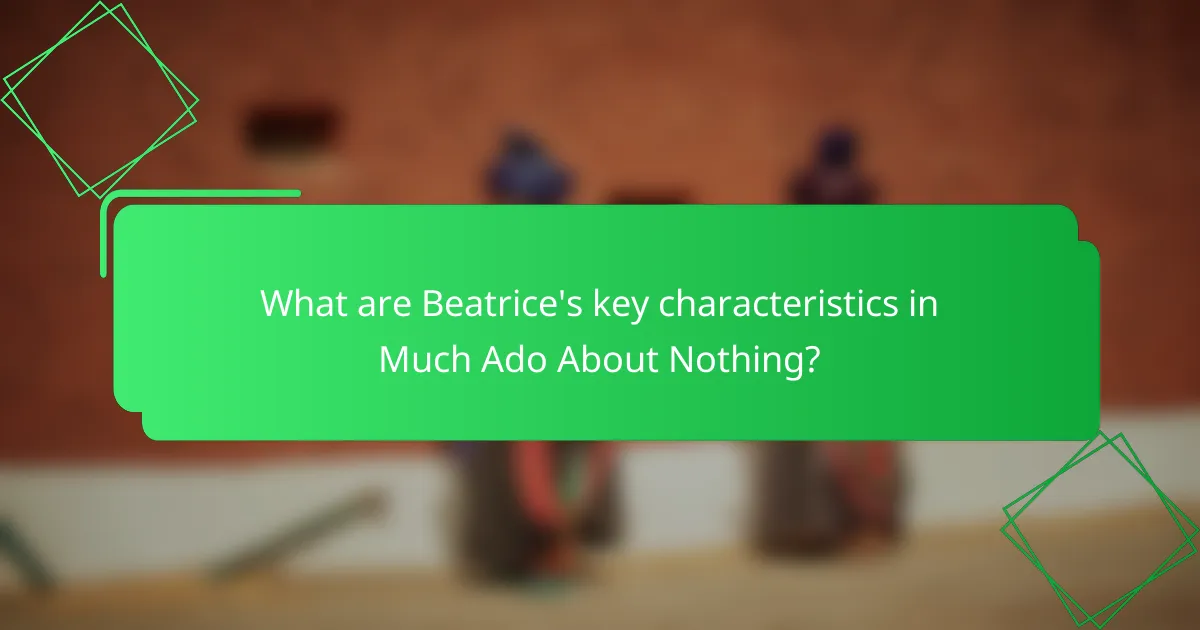
What are Beatrice’s key characteristics in Much Ado About Nothing?
Beatrice’s key characteristics in Much Ado About Nothing include her sharp wit, independence, and strong personality. She is known for her clever wordplay and humorous banter, often engaging in verbal sparring with Benedick. Beatrice exhibits a strong sense of autonomy, resisting societal expectations regarding marriage. Her loyalty to her cousin Hero demonstrates her deep emotional capacity. Additionally, Beatrice’s evolution throughout the play reveals her vulnerability and desire for love. These traits contribute to her complexity as a character and highlight her role as a feminist figure in the play.
How does Beatrice’s wit manifest throughout the play?
Beatrice’s wit manifests through sharp verbal exchanges and clever wordplay. She often engages in banter with Benedick, showcasing her intelligence and humor. For instance, she uses puns and double entendres to assert her dominance in conversations. Her quick retorts highlight her ability to think on her feet. Beatrice also employs sarcasm, particularly when critiquing societal norms regarding women. In Act 1, Scene 1, she mocks the idea of marriage, stating, “I had rather hear my dog bark at a crow than a man swear he loves me.” This illustrates her disdain for conventional romantic expressions. Her wit serves as both a defense mechanism and a means of social commentary. Throughout the play, Beatrice’s cleverness attracts Benedick, ultimately leading to their mutual recognition of love.
What are some notable examples of Beatrice’s clever dialogue?
Beatrice’s clever dialogue is characterized by her sharp wit and wordplay. One notable example is when she quips, “I had rather hear my dog bark at a crow than a man swear he loves me.” This line showcases her disdain for insincere declarations of love. Another instance occurs when she retorts to Benedick, saying, “I would not deny you, but by this good day, I cannot.” This reflects her playful banter and complex feelings toward him. Additionally, Beatrice’s remark, “The sweetest lady that ever I looked on,” cleverly highlights her ability to manipulate language to convey deeper meanings. These examples illustrate her intelligence and the depth of her character throughout the play.
How does her wit influence her relationships with other characters?
Beatrice’s wit significantly influences her relationships with other characters in “Much Ado About Nothing.” Her sharp humor creates a dynamic interplay with characters like Benedick, fostering a playful yet competitive rapport. This wit often serves as a defense mechanism, allowing her to navigate societal expectations and assert her independence. It simultaneously endears her to some characters while alienating others, such as Claudio, who misinterprets her sarcasm. Beatrice’s clever banter challenges traditional gender roles, positioning her as a strong female voice in the narrative. Ultimately, her wit not only shapes her interactions but also drives the plot, particularly in her relationship with Benedick, leading to mutual respect and love.
In what ways does Beatrice demonstrate strength?
Beatrice demonstrates strength through her sharp wit and assertive nature. She often engages in clever banter, showcasing her intelligence and quick thinking. Beatrice stands up for herself, refusing to conform to societal expectations of women. Her independence is evident in her reluctance to marry without love. She confronts challenges head-on, such as her conflict with Benedick and her loyalty to Hero. Beatrice’s emotional resilience is highlighted when she supports her cousin during difficult times. She boldly expresses her opinions, even in the face of male dominance. Overall, Beatrice embodies strength through her intellect, independence, and unwavering loyalty.
How does Beatrice’s strength challenge societal norms?
Beatrice’s strength challenges societal norms by defying traditional gender roles. She exhibits independence and assertiveness uncommon for women in her society. Beatrice openly expresses her opinions and desires, rejecting the expectation of female submissiveness. Her wit and intelligence allow her to engage in verbal sparring with men, showcasing her equality. This behavior contrasts sharply with the passive roles typically assigned to women. Beatrice’s refusal to conform to societal expectations highlights the limitations placed on women. Her character serves as a critique of the patriarchal society in which she exists. Through Beatrice, Shakespeare illustrates the potential for women to assert their agency and challenge the status quo.
What situations reveal her resilience and independence?
Beatrice demonstrates her resilience and independence through various confrontations and her assertive dialogue. She consistently challenges societal norms, refusing to conform to expectations of women in her time. For instance, she openly criticizes the institution of marriage, asserting her desire for autonomy. Her witty exchanges with Benedick showcase her ability to maintain control in relationships. Additionally, Beatrice’s reaction to her cousin Hero’s shaming reveals her protective nature and strong moral compass. She confronts those who wronged Hero, illustrating her courage and loyalty. These situations collectively highlight her strength and refusal to be subdued by external pressures.
How does Beatrice evolve over the course of the play?
Beatrice evolves from a sharp-tongued, independent woman to a more vulnerable character throughout the play. Initially, she displays a strong wit and a disdain for marriage. Her banter with Benedick showcases her intelligence and assertiveness. As the play progresses, Beatrice experiences emotional growth. She confronts the pain of her cousin Hero’s public shaming. This incident reveals her capacity for empathy and deep emotional connection. Ultimately, Beatrice’s evolution culminates in her acceptance of love. She agrees to marry Benedick, showcasing a shift from her earlier rejection of romantic commitment. This change illustrates her development from a fiercely independent figure to one who embraces vulnerability and love.
What key events contribute to Beatrice’s character development?
Beatrice’s character development is significantly influenced by several key events in “Much Ado About Nothing.” First, her sharp wit and banter reveal her intelligence and independence. This is evident in her interactions with Benedick, where their playful exchanges showcase her strength. Second, the public shaming of Hero deeply affects Beatrice. She stands up for her cousin, demonstrating her loyalty and moral conviction. Third, the pivotal moment when Benedick confesses his love for her marks a turning point. Beatrice’s acceptance of love signifies her emotional growth. Lastly, the resolution of conflicts by the end of the play illustrates her transformation from a cynical woman to a more open and loving partner. These events collectively shape Beatrice into a more complex and relatable character.
How does her perspective on love change throughout the narrative?
Beatrice’s perspective on love evolves significantly throughout Much Ado About Nothing. Initially, she expresses skepticism and mockery towards romantic relationships. Beatrice often uses wit to dismiss traditional views of love, stating that she will never marry. As the narrative progresses, her interactions with Benedick reveal a deeper complexity in her feelings. She begins to acknowledge her vulnerability and desire for connection. This shift culminates in her acceptance of love as a powerful force. By the end, Beatrice embraces love, indicating a transformation from cynicism to acceptance. This evolution highlights her growth as a character and reflects the play’s themes of love and relationships.
How do Beatrice’s traits contribute to the play’s themes?
Beatrice’s traits significantly contribute to the play’s themes of love, gender roles, and deception. Her wit showcases her intelligence and challenges societal norms. Beatrice often uses sharp humor to critique the expectations placed on women. This challenges the traditional roles women were expected to fulfill in her society. Her strength is evident in her refusal to conform to these roles. She expresses her opinions boldly, especially regarding love and marriage. This defiance emphasizes the theme of female empowerment. Additionally, her evolution throughout the play highlights the transformative power of love. Beatrice’s eventual acceptance of vulnerability signifies a shift in her character. This shift reinforces the idea that love can change individuals. Overall, her traits serve as a vehicle for exploring deeper themes within the narrative.
What role does her wit play in the theme of deception?
Beatrice’s wit serves as a critical tool in the theme of deception in Much Ado About Nothing. Her sharp intelligence enables her to navigate social situations with cunning. Beatrice often uses her wit to challenge societal norms and expose hypocrisy. For instance, her playful banter with Benedick disguises her true feelings, creating a layer of deception. This deception ultimately leads to a deeper understanding of love and relationships. Additionally, her wit allows her to manipulate the perceptions of others, revealing the fragility of truth. In this way, Beatrice’s wit not only highlights the theme of deception but also critiques the societal expectations of her time.
How does her strength relate to the theme of gender roles?
Beatrice’s strength challenges traditional gender roles in “Much Ado About Nothing.” Her assertiveness and independence defy the expectations placed on women in her society. Beatrice often expresses her opinions openly, demonstrating intellectual strength. This contrasts with the submissive role typically assigned to women during the Elizabethan era. Her refusal to conform to societal norms highlights the limitations of gender roles. For instance, she openly critiques male characters and their behavior, asserting her right to voice her thoughts. This active resistance to patriarchal constraints illustrates the theme of gender roles throughout the play. Beatrice’s strength ultimately serves as a critique of the expectations placed on women, advocating for their autonomy and agency.
What insights can we gain from Beatrice’s character in Much Ado About Nothing?
Beatrice’s character in Much Ado About Nothing reveals insights into female agency and wit. She embodies intelligence and independence, often challenging societal norms. Her sharp tongue and quick wit highlight her refusal to conform to traditional gender roles. Beatrice’s interactions with Benedick demonstrate her complexity and vulnerability. She desires love but masks her feelings with humor. Throughout the play, her character evolves, showcasing growth and emotional depth. Ultimately, Beatrice represents a progressive view of women in Shakespeare’s time, advocating for equality in love and partnership.
What lessons about love and friendship can Beatrice teach us?
Beatrice teaches us that love involves honesty and vulnerability. She openly expresses her feelings for Benedick despite societal expectations. This honesty fosters genuine connections. Beatrice also demonstrates the importance of wit in relationships. Her sharp humor engages others and deepens bonds. Additionally, she values friendship and loyalty. Beatrice stands by her cousin Hero, showcasing support during difficult times. Her character illustrates that love and friendship thrive on mutual respect and understanding. These lessons highlight the significance of authenticity in relationships.
How can Beatrice’s wit and strength inspire modern audiences?
Beatrice’s wit and strength can inspire modern audiences by showcasing the power of intelligence and resilience. Her sharp humor challenges societal norms and highlights the importance of individuality. Beatrice’s ability to engage in witty banter demonstrates confidence and assertiveness. This encourages audiences to embrace their own voices and stand up for their beliefs. Her strength in navigating complex relationships reveals the value of emotional intelligence. By prioritizing loyalty and honesty, she sets an example for modern interpersonal dynamics. Beatrice’s character illustrates that humor and strength can coexist, promoting a balanced approach to life’s challenges. This duality resonates with contemporary themes of empowerment and self-expression.
The main entity of the article is Beatrice, a character from Shakespeare’s play “Much Ado About Nothing.” The article explores Beatrice’s key characteristics, including her sharp wit, independence, and strength, highlighting how these traits influence her relationships and challenge societal norms. It details her evolution throughout the play, showcasing her journey from a cynical view of love to a more vulnerable acceptance of it. Additionally, the article examines how Beatrice’s wit serves as a tool for social commentary and deception, while her strength critiques traditional gender roles, ultimately providing insights into female agency and the dynamics of love and friendship.


